Can someoen help me to write c program including C inheritan
Can someoen help me to write c++ program including C++ inheritance, polymorphism, virtual function, containment, file operations, and exception handling.
// Q1a: Create Dog Class
// Part 1: Create a child class of the Pet class named \'Dog\'
// See the add function in hw10.cpp for proper use of this function.
// Part2: Declare constructor which accepts the same 3 parameters as the parent class Pet.
// Pass the 3 parameters to the super constructor in the Pet class.
// Part 3: Re-declare the method display (virtual method found inside of parent class Pet)
// Q2a: Define Display for Dog class
// Define the method display that you declared within the Dog class in the header file
// Information should be printed in the following format:
// Name: <name>
// Breed: <breed>
// Type: Dog
// (See the print_all function in hw10.cpp for proper use of this function.)
// READ BEFORE YOU START:
// You are given a partially completed program that creates a list of pets.
// Each pet has the corresponding information: name, breed, and type.
// In the Pet.h file, you will find the definition for this enum \'type\'.
// Pets on the list can be 2 different \'types\' : either a dog or a cat.
// The classes Dog and Cat are subclasses of the Pet class (found in Pet.h).
// Both of these classes will have their own use of the virtual display method.
//
// To begin, you should trace through the given code and understand how it works.
// Please read the instructions above each required function and follow the directions carefully.
// If you modify any of the given code, the return types, or the parameters, you risk failing the automated test cases.
//
// You are to assume that all input is valid:
// Valid name: String containing alphabetical letters beginning with a capital letter
// Valid breed: String containing alphabetical letters beginning with a capital letter
// All input will be a valid length and no more than the allowed amount of memory will be used
#include \"Container.h\"
#include \"Pet.h\"
#include \"Dog.h\"
#include \"Cat.h\"
#include <iostream>
#include <fstream>
#include <string>
using namespace std;
// forward declarations
void flush();
void branching(char);
void helper(char);
void add_pet(string, string, Type);
Pet* search_pet(string, string, Type);
void remove_pet(string, string, Type);
void remove_all();
void print_all();
void save(string); // 10 points
void load(string); // 10 points
Container* list = NULL; // global list
int main()
{
_CrtSetDbgFlag(_CRTDBG_ALLOC_MEM_DF | _CRTDBG_LEAK_CHECK_DF); // Use to check for memory leaks in VS
load(\"Pets.txt\");
char ch = \'i\';
do {
cout << \"Please enter your selection\" << endl;
cout << \"\\ta: add a new pet to the list\" << endl;
cout << \"\\tc: change the breed of a pet\" << endl;
cout << \"\\tr: remove a pet from the list\" << endl;
cout << \"\\tp: print all pets on the list\" << endl;
cout << \"\\tq: quit and save list of pets\" << endl;
cin >> ch;
flush();
branching(ch);
} while (ch != \'q\');
save(\"Pets.txt\");
remove_all();
list = NULL;
return 0;
}
void flush()
{
int c;
do c = getchar(); while (c != \'\ \' && c != EOF);
}
void branching(char c)
{
switch (c) {
case \'a\':
case \'c\':
case \'r\':
case \'p\':
helper(c);
break;
case \'q\':
break;
default:
printf(\"\ Invalid input!\ \ \");
}
}
// The helper function is used to determine how much data is needed and which function to send that data to.
// It uses pointers and values that are returned from some functions to produce the correct ouput.
// There is no implementation needed here, but you should study this function and know how it works.
// It is always helpful to understand how the code works before implementing new features.
// Do not change anything in this function or you risk failing the automated test cases.
void helper(char c)
{
string name, breed;
Type type;
int type_check = -1;
if (c == \'p\')
print_all();
else
{
cout << endl << \"Please enter the pet\'s name: \" << endl;
cin >> name;
cout << \"Please enter the pet\'s breed: \" << endl;
cin >> breed;
while (!(type_check == 0 || type_check == 1))
{
cout << endl << \"Please select one of the following: \" << endl;
cout << \"0. Dog \" << endl;
cout << \"1. Cat\" << endl;
cin >> type_check;
}
type = (Type)type_check;
Pet* pet_result = search_pet(name, breed, type);
if (c == \'a\') // add pet
{
if (pet_result == NULL)
{
add_pet(name, breed, type);
cout << endl << \"Pet added.\" << endl << endl;
}
else
cout << endl << \"Pet already on list.\" << endl << endl;
}
else if (c == \'c\') // change pet breed
{
if (pet_result == NULL)
{
cout << endl << \"Pet not found.\" << endl << endl;
return;
}
cout << endl << \"Please enter the new breed for this pet: \" << endl;
cin >> breed; flush();
// Q3c: Call Change Breed Function
cout << endl << \"Pet\'s breed changed.\" << endl << endl;
}
else if (c == \'r\') // remove pet
{
if (pet_result == NULL)
{
cout << endl << \"Pet not found.\" << endl << endl;
return;
}
remove_pet(name, breed, type);
cout << endl << \"Pet removed from the list.\" << endl << endl;
}
}
}
// Q3b: Define Friend Function Change Breed
// Define the function changeBreed that is declared within the Pet.h file.
// This function sets the breed value of the Pet pointer to the value of the string parameter.
// Q4: Add Pet
// This function will be used to add a new pet to the tail of the global linked list.
// You will need to use the enum ëtypeí variable to determine which constructor to use.
// Remember that search is called before this function, therefore, the new pet is not on the list.
void add_pet(string name, string breed, Type type)
{
}
// No implementation needed here, however it may be helpful to review this function
Pet* search_pet(string name, string breed, Type type)
{
Container* container_traverser = list;
while (container_traverser != NULL)
{
if (container_traverser->pet->getName() == name
&& container_traverser->pet->getBreed() == breed
&& container_traverser->pet->getType() == type)
return container_traverser->pet;
container_traverser = container_traverser->next;
}
return NULL;
}
// No implementation needed here, however it may be helpful to review this function
void remove_pet(string name, string breed, Type type)
{
Container* to_be_removed;
if (list->pet->getName() == name
&& list->pet->getBreed() == breed
&& list->pet->getType() == type)
{
to_be_removed = list;
list = list->next;
delete to_be_removed->pet;
delete to_be_removed;
return;
}
Container* container_traverser = list->next;
Container* container_follower = list;
while (container_traverser != NULL)
{
if (container_traverser->pet->getName() == name
&& container_traverser->pet->getBreed() == breed
&& container_traverser->pet->getType() == type)
{
to_be_removed = container_traverser;
container_traverser = container_traverser->next;
container_follower->next = container_traverser;
delete to_be_removed->pet;
delete to_be_removed;
return;
}
container_follower = container_traverser;
container_traverser = container_traverser->next;
}
}
// No implementation needed here, however it may be helpful to review this function
void remove_all()
{
while (list != NULL)
{
Container* temp = list;
list = list->next;
delete temp->pet;
delete temp;
}
}
// This function uses the virtual display() method of the Dog and Cat classes to print all Pets in an oragnized format.
void print_all()
{
Container *container_traverser = list;
if (list == NULL)
cout << endl << \"List is empty!\" << endl << endl;
while (container_traverser != NULL)
{
container_traverser->pet->display();
container_traverser = container_traverser->next;
}
}
// Q5a: Save (5 points)
// Save the linked list of pets to a file using ofstream.
// You will need to come up with a way to store the amount of Containers in linked list.
// Hint: You may want to cast the enum \'type\' to an int before writing it to the file.
void save(string fileName)
{
}
// Q5b: Load (5 points)
// Load the linked list of pets from a file using ifstream.
// You will need to create the linked list in the same order that is was saved to a file.
// You will need to create a new node for the linked list, then add it to the tail of the list.
// Hint: If you casted the enum \'type\' to an int, you will need to cast it back to a \'Type\'.
// You will use the \'type\' variable read from the file to determine which constructor to use.
void load(string fileName)
{
}
| Can someoen help me to write c++ program including C++ inheritance, polymorphism, virtual function, containment, file operations, and exception handling. // Q1a: Create Dog Class // Part 1: Create a child class of the Pet class named \'Dog\' // See the add function in hw10.cpp for proper use of this function. // Part2: Declare constructor which accepts the same 3 parameters as the parent class Pet. // Pass the 3 parameters to the super constructor in the Pet class. // Part 3: Re-declare the method display (virtual method found inside of parent class Pet) // Q2a: Define Display for Dog class // Define the method display that you declared within the Dog class in the header file // Information should be printed in the following format: // Name: <name> // Breed: <breed> // Type: Dog // (See the print_all function in hw10.cpp for proper use of this function.) // READ BEFORE YOU START: // You are given a partially completed program that creates a list of pets. // Each pet has the corresponding information: name, breed, and type. // In the Pet.h file, you will find the definition for this enum \'type\'. // Pets on the list can be 2 different \'types\' : either a dog or a cat. // The classes Dog and Cat are subclasses of the Pet class (found in Pet.h). // Both of these classes will have their own use of the virtual display method. // // To begin, you should trace through the given code and understand how it works. // Please read the instructions above each required function and follow the directions carefully. // If you modify any of the given code, the return types, or the parameters, you risk failing the automated test cases. // // You are to assume that all input is valid: // Valid name: String containing alphabetical letters beginning with a capital letter // Valid breed: String containing alphabetical letters beginning with a capital letter // All input will be a valid length and no more than the allowed amount of memory will be used #include \"Container.h\" #include \"Pet.h\" #include \"Dog.h\" #include \"Cat.h\" #include <iostream> #include <fstream> #include <string> using namespace std; // forward declarations void flush(); void branching(char); void helper(char); void add_pet(string, string, Type); Pet* search_pet(string, string, Type); void remove_pet(string, string, Type); void remove_all(); void print_all(); void save(string); // 10 points void load(string); // 10 points Container* list = NULL; // global list int main() { _CrtSetDbgFlag(_CRTDBG_ALLOC_MEM_DF | _CRTDBG_LEAK_CHECK_DF); // Use to check for memory leaks in VS load(\"Pets.txt\"); char ch = \'i\'; do { cout << \"Please enter your selection\" << endl; cout << \"\\ta: add a new pet to the list\" << endl; cout << \"\\tc: change the breed of a pet\" << endl; cout << \"\\tr: remove a pet from the list\" << endl; cout << \"\\tp: print all pets on the list\" << endl; cout << \"\\tq: quit and save list of pets\" << endl; cin >> ch; flush(); branching(ch); } while (ch != \'q\'); save(\"Pets.txt\"); remove_all(); list = NULL; return 0; } void flush() { int c; do c = getchar(); while (c != \'\ \' && c != EOF); } void branching(char c) { switch (c) { case \'a\': case \'c\': case \'r\': case \'p\': helper(c); break; case \'q\': break; default: printf(\"\ Invalid input!\ \ \"); } } // The helper function is used to determine how much data is needed and which function to send that data to. // It uses pointers and values that are returned from some functions to produce the correct ouput. // There is no implementation needed here, but you should study this function and know how it works. // It is always helpful to understand how the code works before implementing new features. // Do not change anything in this function or you risk failing the automated test cases. void helper(char c) { string name, breed; Type type; int type_check = -1; if (c == \'p\') print_all(); else { cout << endl << \"Please enter the pet\'s name: \" << endl; cin >> name; cout << \"Please enter the pet\'s breed: \" << endl; cin >> breed; while (!(type_check == 0 || type_check == 1)) { cout << endl << \"Please select one of the following: \" << endl; cout << \"0. Dog \" << endl; cout << \"1. Cat\" << endl; cin >> type_check; } type = (Type)type_check; Pet* pet_result = search_pet(name, breed, type); if (c == \'a\') // add pet { if (pet_result == NULL) { add_pet(name, breed, type); cout << endl << \"Pet added.\" << endl << endl; } else cout << endl << \"Pet already on list.\" << endl << endl; } else if (c == \'c\') // change pet breed { if (pet_result == NULL) { cout << endl << \"Pet not found.\" << endl << endl; return; } cout << endl << \"Please enter the new breed for this pet: \" << endl; cin >> breed; flush(); // Q3c: Call Change Breed Function cout << endl << \"Pet\'s breed changed.\" << endl << endl; } else if (c == \'r\') // remove pet { if (pet_result == NULL) { cout << endl << \"Pet not found.\" << endl << endl; return; } remove_pet(name, breed, type); cout << endl << \"Pet removed from the list.\" << endl << endl; } } } // Q3b: Define Friend Function Change Breed // Define the function changeBreed that is declared within the Pet.h file. // This function sets the breed value of the Pet pointer to the value of the string parameter. // Q4: Add Pet // This function will be used to add a new pet to the tail of the global linked list. // You will need to use the enum ëtypeí variable to determine which constructor to use. // Remember that search is called before this function, therefore, the new pet is not on the list. void add_pet(string name, string breed, Type type) { } // No implementation needed here, however it may be helpful to review this function Pet* search_pet(string name, string breed, Type type) { Container* container_traverser = list; while (container_traverser != NULL) { if (container_traverser->pet->getName() == name && container_traverser->pet->getBreed() == breed && container_traverser->pet->getType() == type) return container_traverser->pet; container_traverser = container_traverser->next; } return NULL; } // No implementation needed here, however it may be helpful to review this function void remove_pet(string name, string breed, Type type) { Container* to_be_removed; if (list->pet->getName() == name && list->pet->getBreed() == breed && list->pet->getType() == type) { to_be_removed = list; list = list->next; delete to_be_removed->pet; delete to_be_removed; return; } Container* container_traverser = list->next; Container* container_follower = list; while (container_traverser != NULL) { if (container_traverser->pet->getName() == name && container_traverser->pet->getBreed() == breed && container_traverser->pet->getType() == type) { to_be_removed = container_traverser; container_traverser = container_traverser->next; container_follower->next = container_traverser; delete to_be_removed->pet; delete to_be_removed; return; } container_follower = container_traverser; container_traverser = container_traverser->next; } } // No implementation needed here, however it may be helpful to review this function void remove_all() { while (list != NULL) { Container* temp = list; list = list->next; delete temp->pet; delete temp; } } // This function uses the virtual display() method of the Dog and Cat classes to print all Pets in an oragnized format. void print_all() { Container *container_traverser = list; if (list == NULL) cout << endl << \"List is empty!\" << endl << endl; while (container_traverser != NULL) { container_traverser->pet->display(); container_traverser = container_traverser->next; } } // Q5a: Save (5 points) // Save the linked list of pets to a file using ofstream. // You will need to come up with a way to store the amount of Containers in linked list. // Hint: You may want to cast the enum \'type\' to an int before writing it to the file. void save(string fileName) {
} // Q5b: Load (5 points) // Load the linked list of pets from a file using ifstream. // You will need to create the linked list in the same order that is was saved to a file. // You will need to create a new node for the linked list, then add it to the tail of the list. // Hint: If you casted the enum \'type\' to an int, you will need to cast it back to a \'Type\'. // You will use the \'type\' variable read from the file to determine which constructor to use. void load(string fileName) {
} |
Solution
Answers to Q1, Q2, Q3.
Implement parent class Pet. Derive child classes dog and cat from pet. Implement the virtual function display(). Implement a friend function whih acts as bridge between classes.
// pet.h
#include <iostream>
#include <string>
using namespace std;
enum Type {dog, cat}; //type can be only of 2 types cat and dog
// Parent class
class Pet { //3 parameters of parent class pet
public:
string name;
string breed;
Type type;
//constructor
Pet( string n, string b, Type t) {
name = n;
breed = b;
type = t;
}
virtual void display(){}; //virtual display function
};
// Derived child Dog class
//Q1a
class Dog: public Pet { //Q1a PART 2
public:
Dog(string n,string b, Type t) : Pet(n, b, dog) {};
//Q2a
void display() { //Q1a PART 3
cout << \"Name :\" << name << endl;
cout << \"Breed :\" << breed << endl;
cout << \"Type :Dog\" << endl << endl;
}
friend void changeBreed(Pet*, string); //friend function
};
// Derived child Cat class
class Cat: public Pet {
public:
Cat(string n, string b, Type t) : Pet(n, b, cat) {};
void display() {
cout << \"Name :\" << name << endl;
cout << \"Breed :\" << breed << endl;
cout << \"Type :Cat\" << endl << endl;
}
friend void changeBreed(Pet*, string); //friend function
};
//Q3b
//friend function implementation
void changeBreed(Pet *p, string newBreed) {
p->breed = newBreed; //set breed value to new value from parameter
}
int main()
{
//Examples
Pet* p;
Dog dog1(\"Alfa\", \"Pug\", dog);
Cat cat1(\"Purry\", \"Persian\", cat);
dog1.display();
cat1.display();
p = &dog1;
changeBreed(p, \"Bulldog\");
dog1.display();
return 0;
}
Output :
Name :Alfa
Breed :Pug
Type :Dog
Name :Purry
Breed :Persian
Type :Cat
Name :Alfa
Breed :Bulldog
Type :Dog
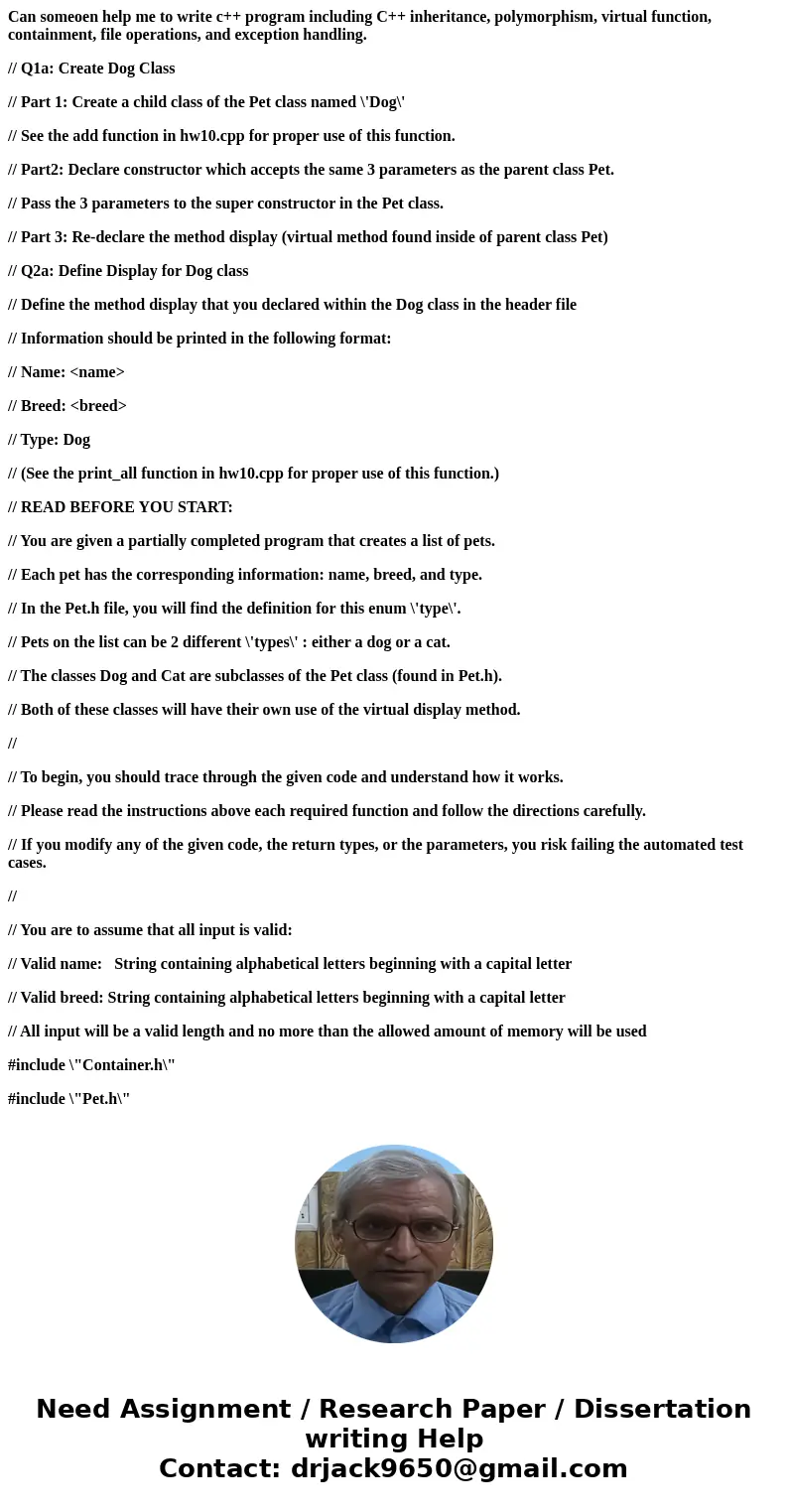
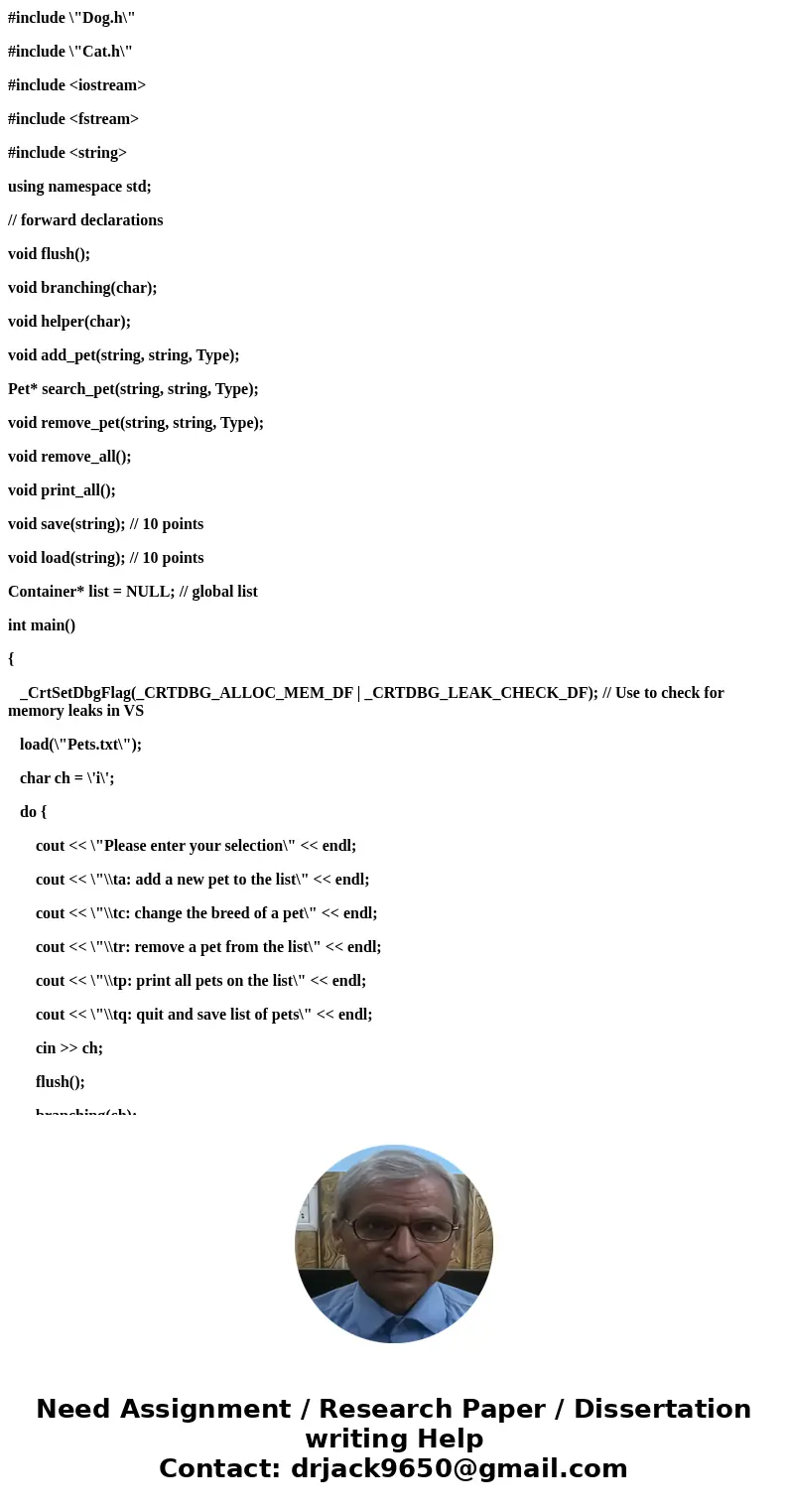
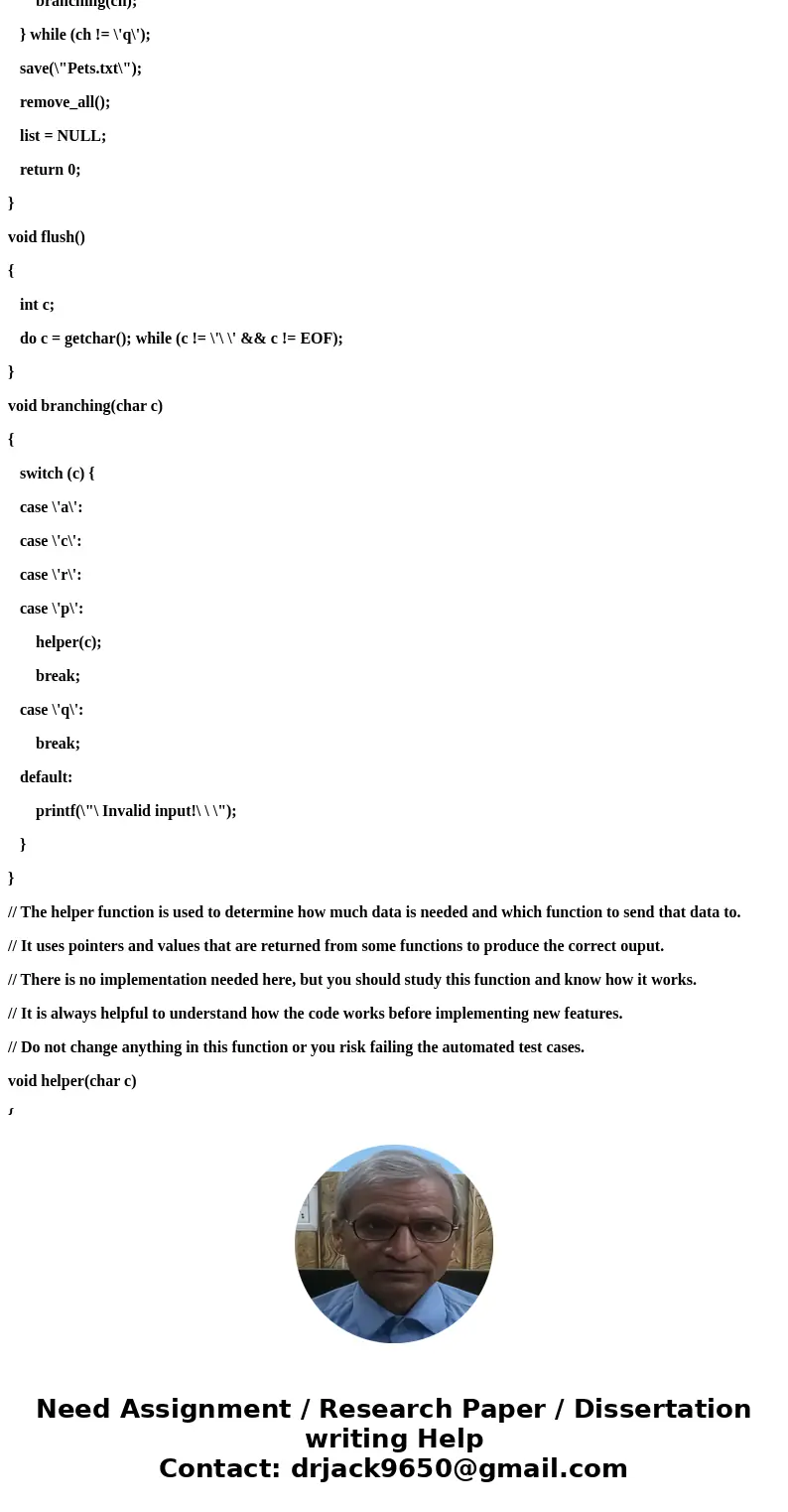
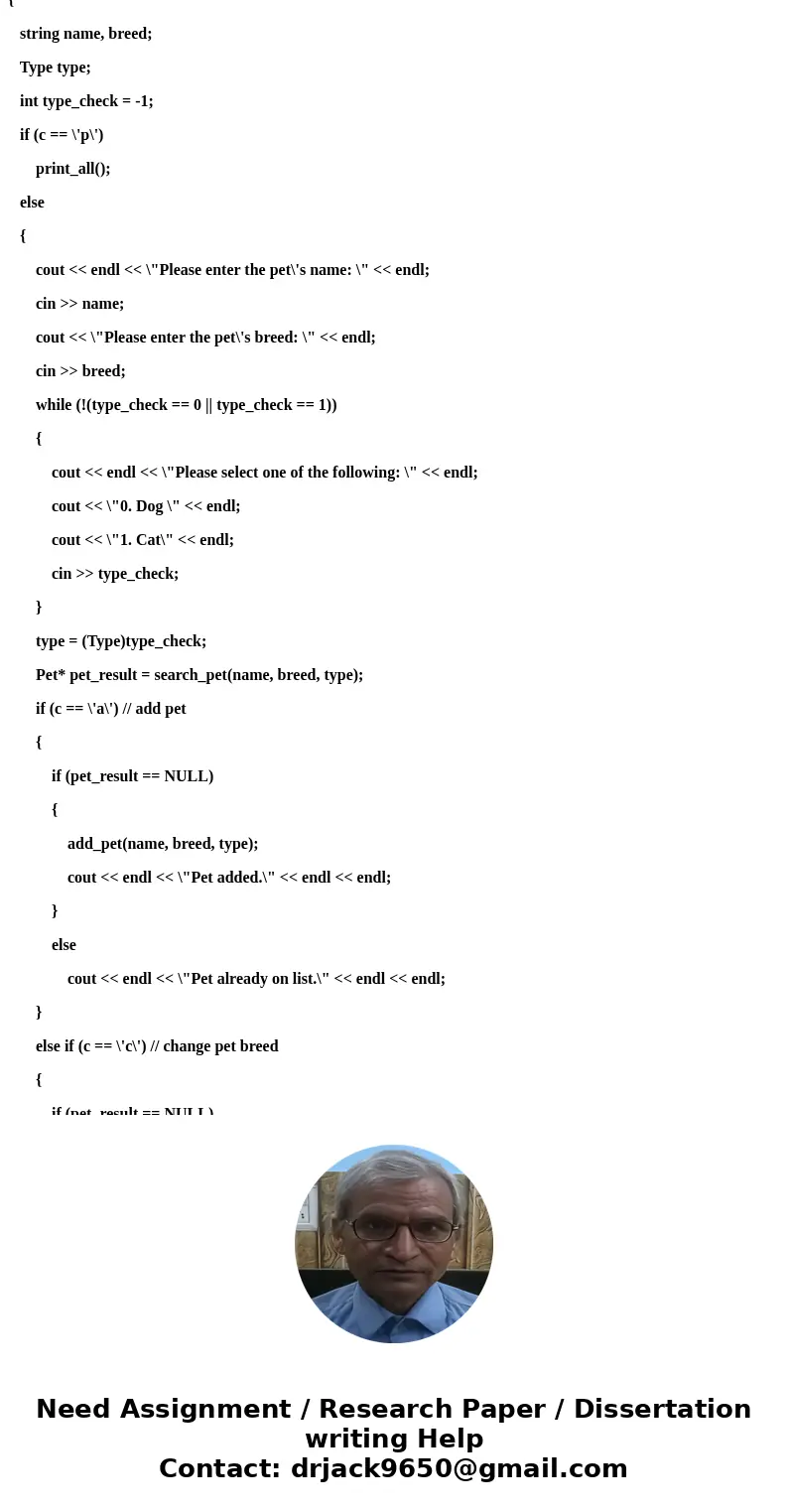
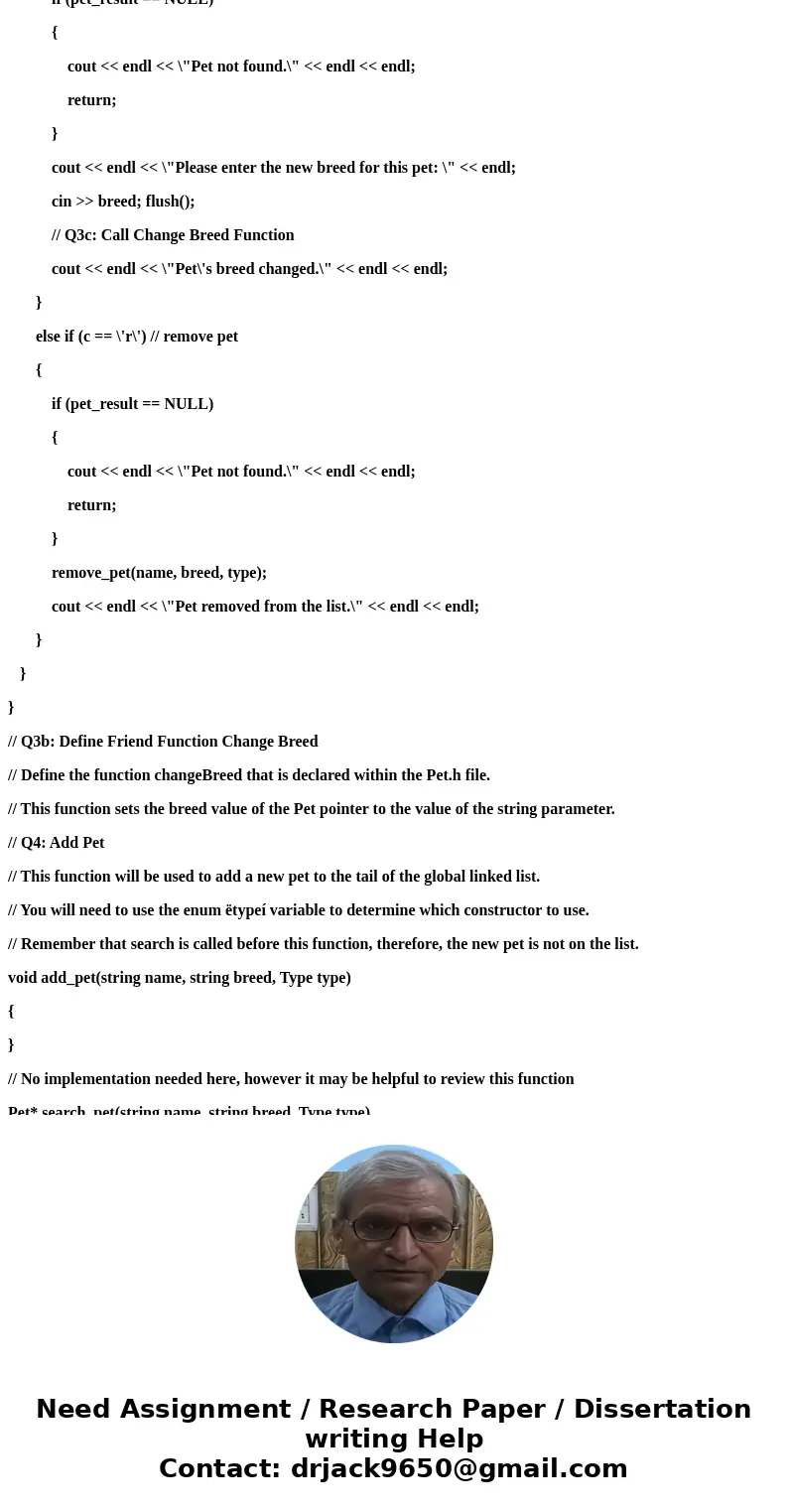
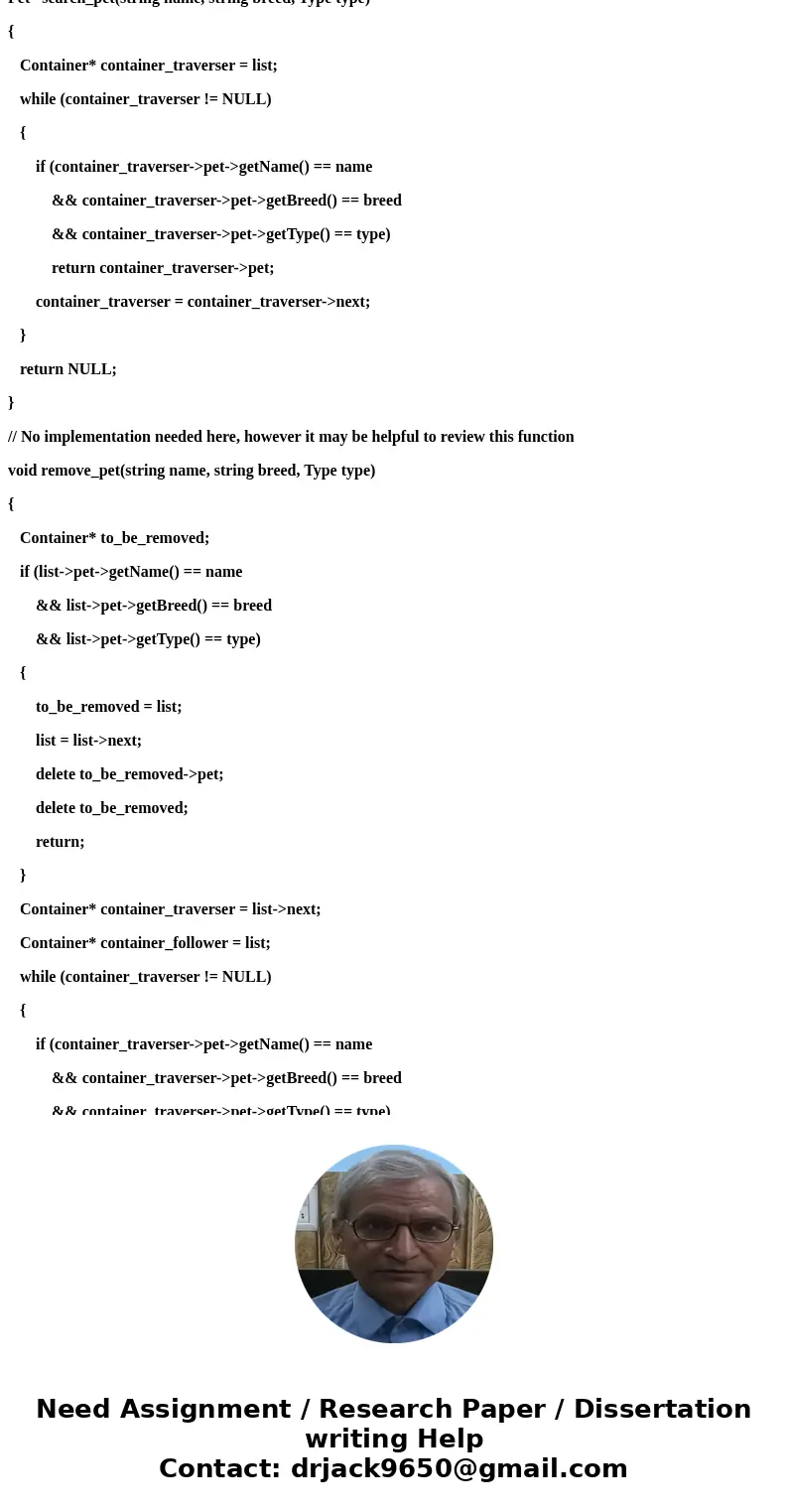
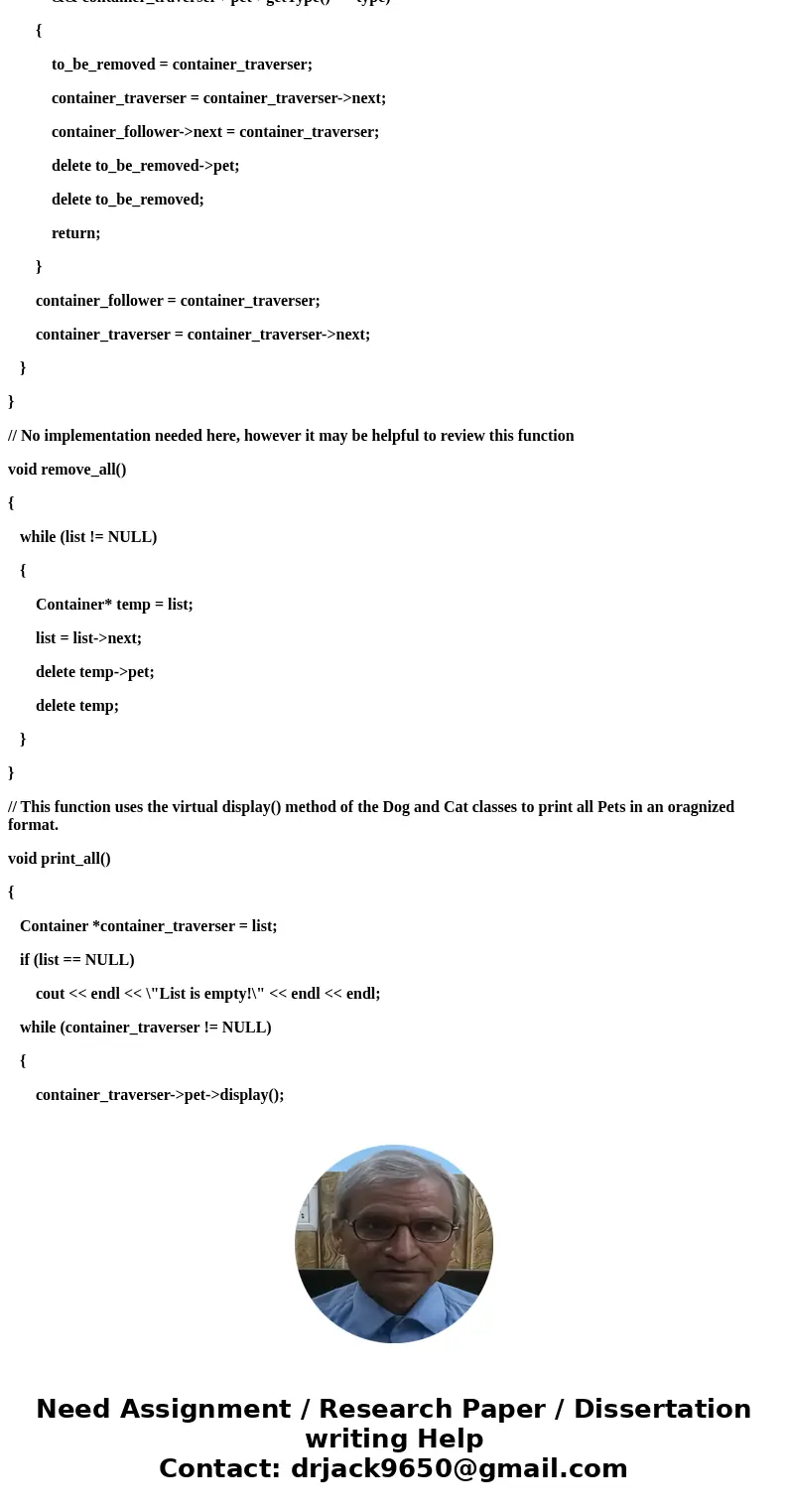
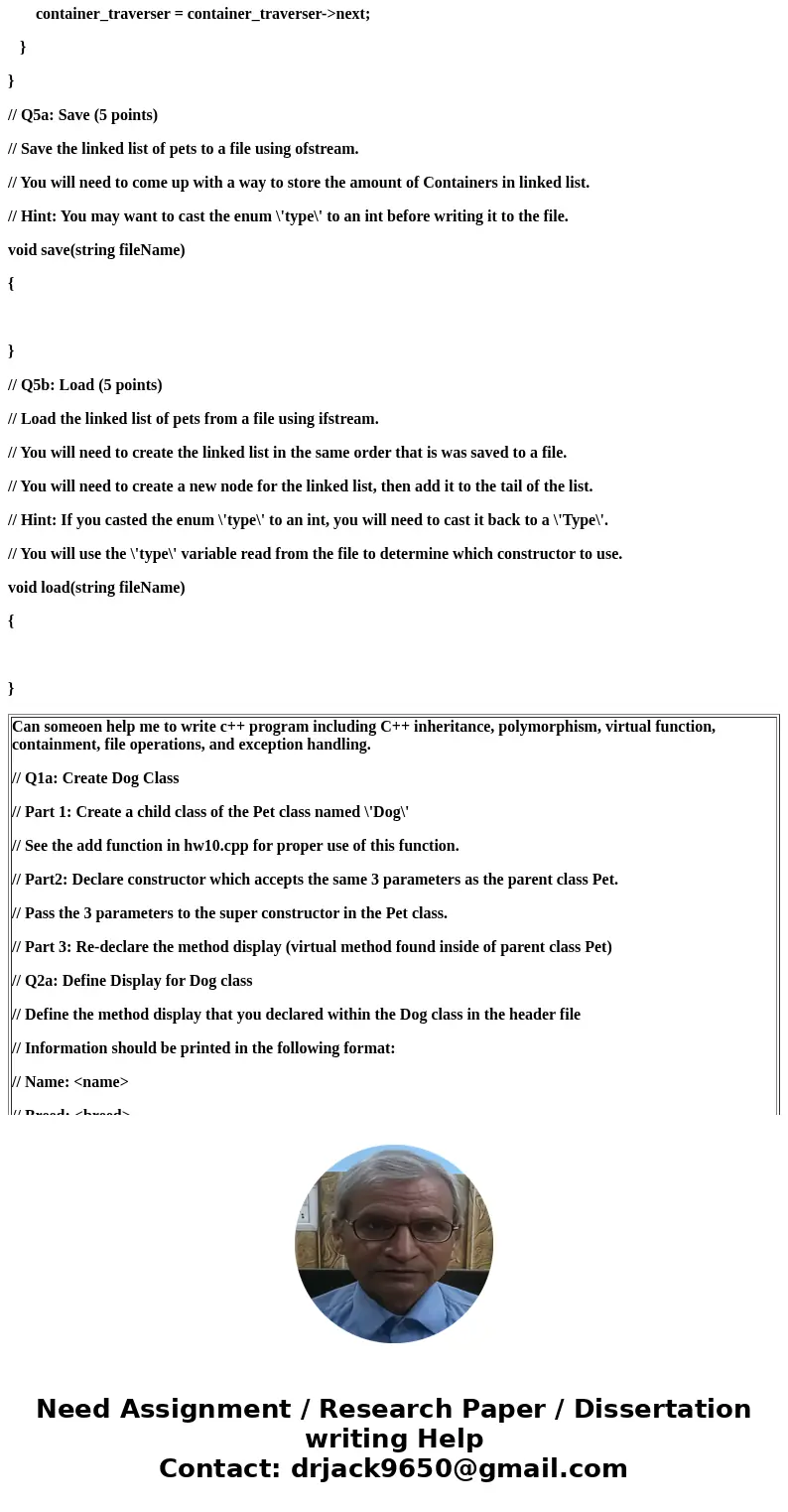
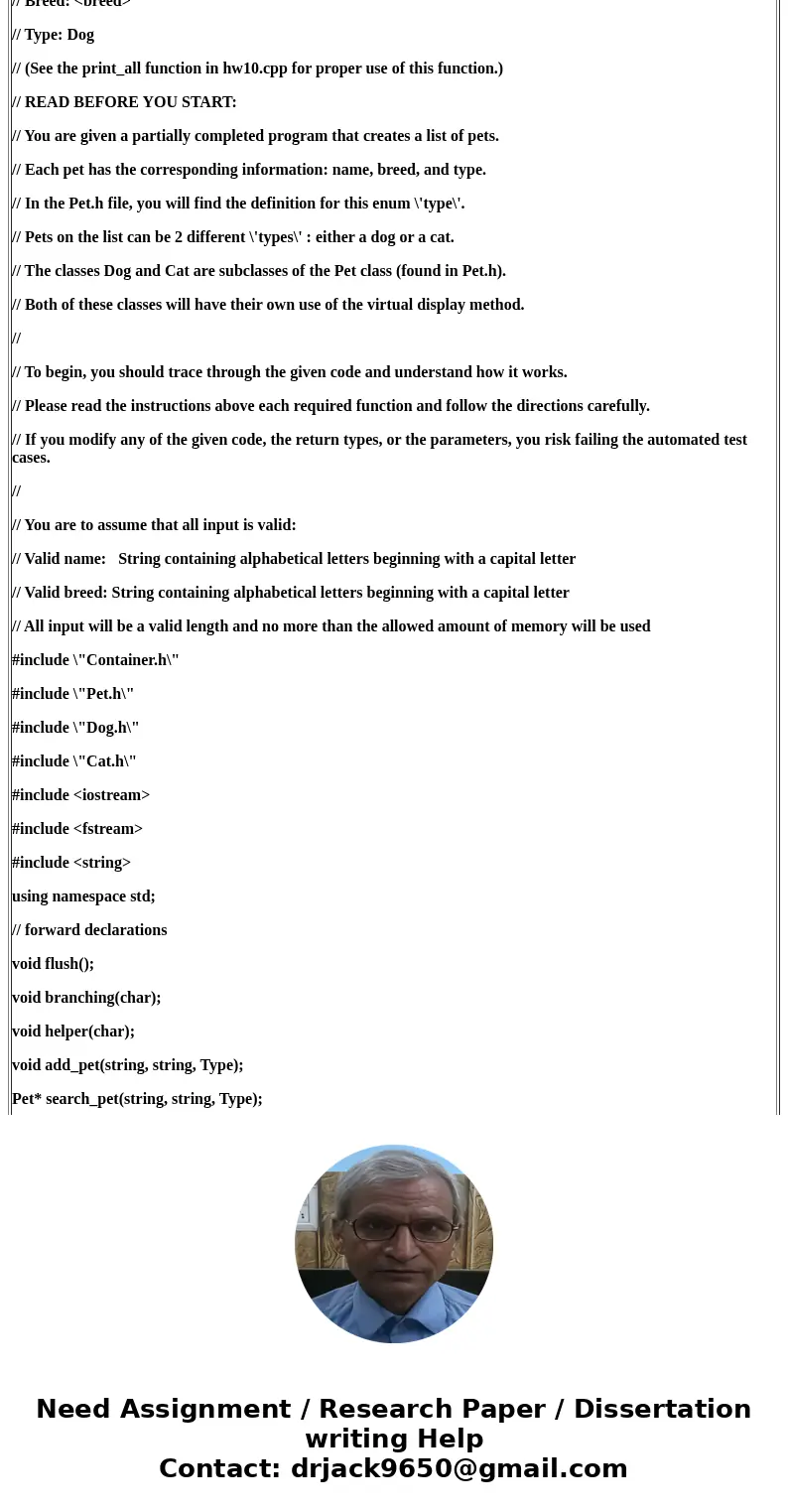
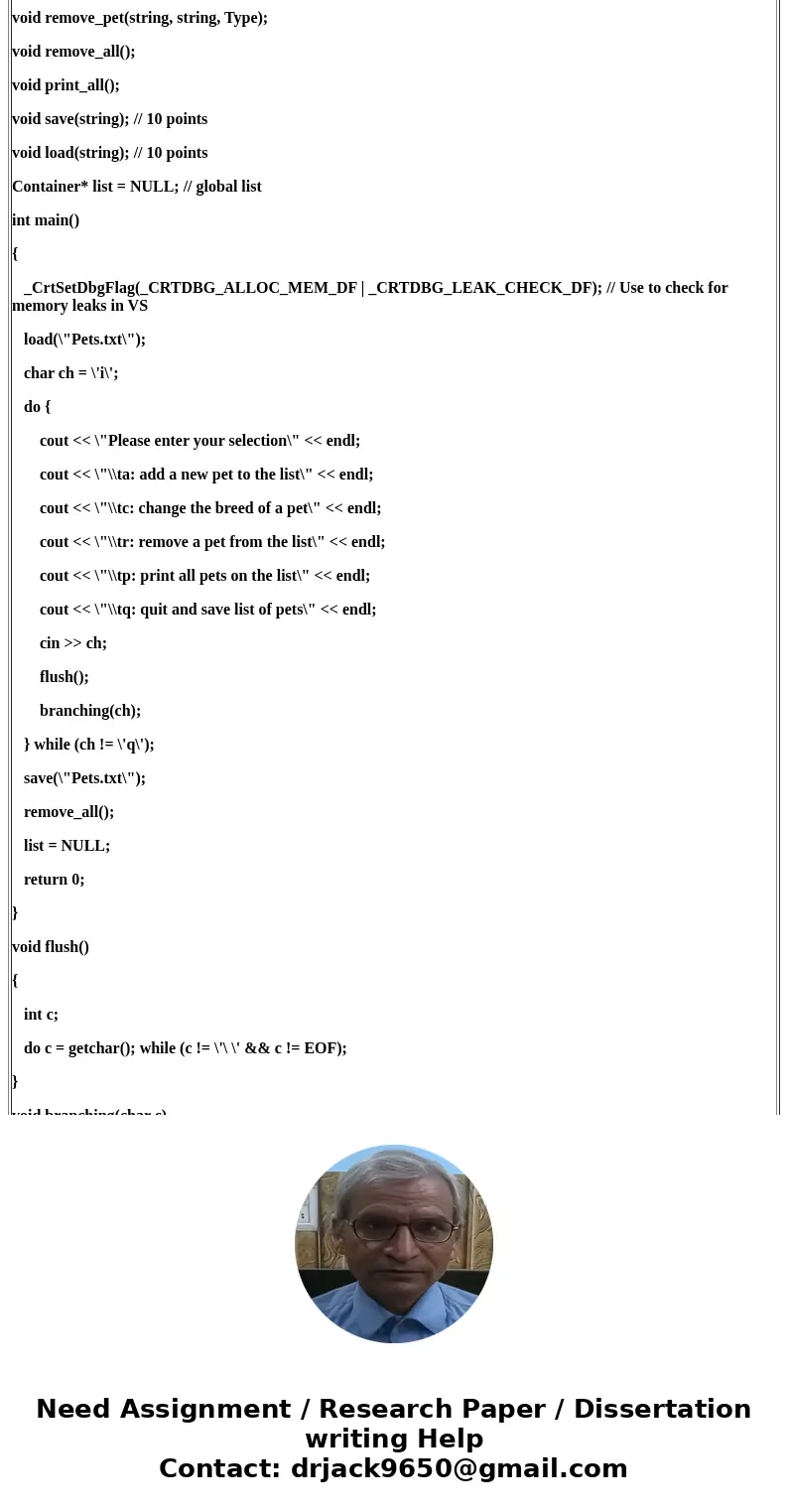
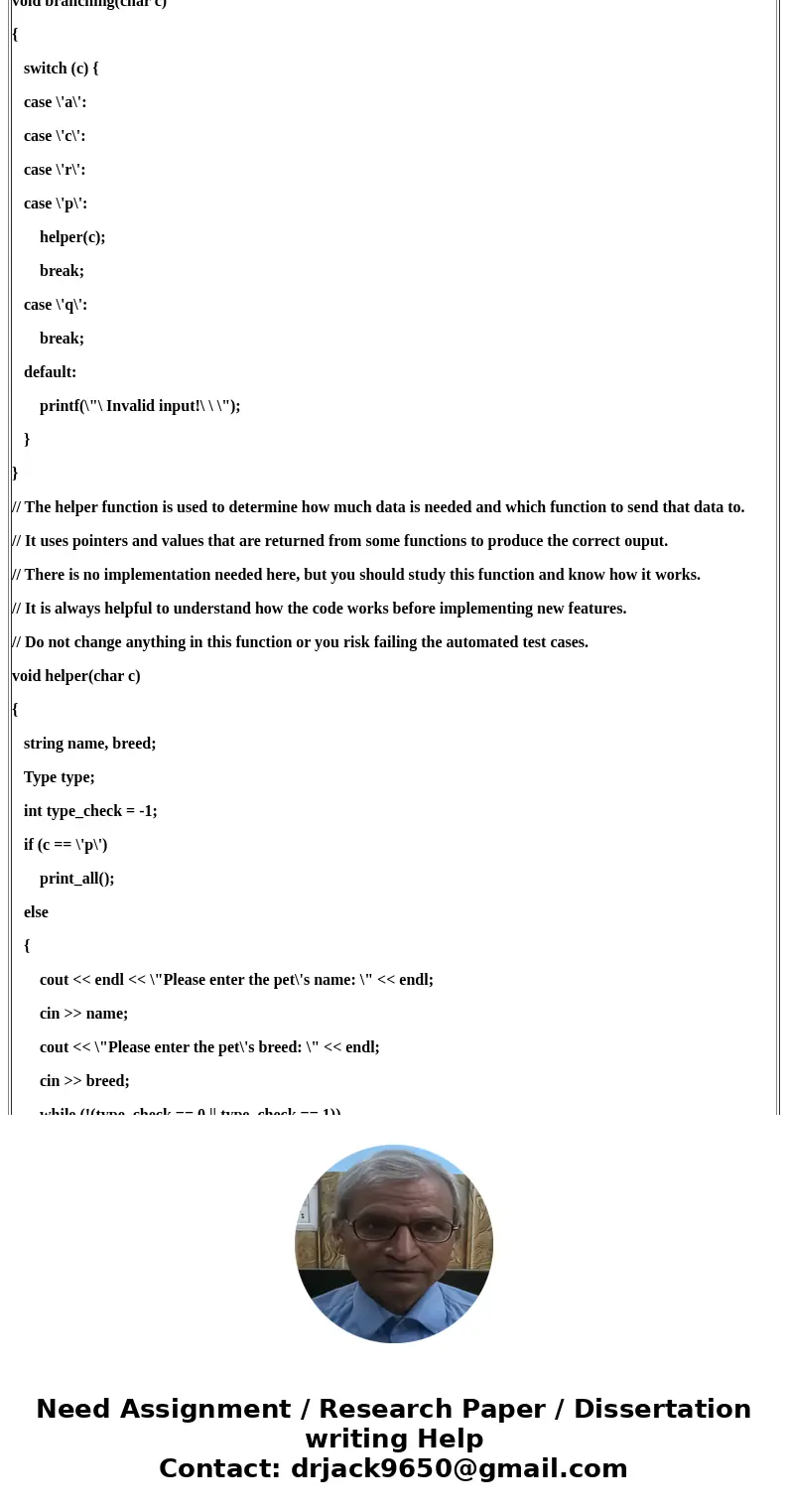
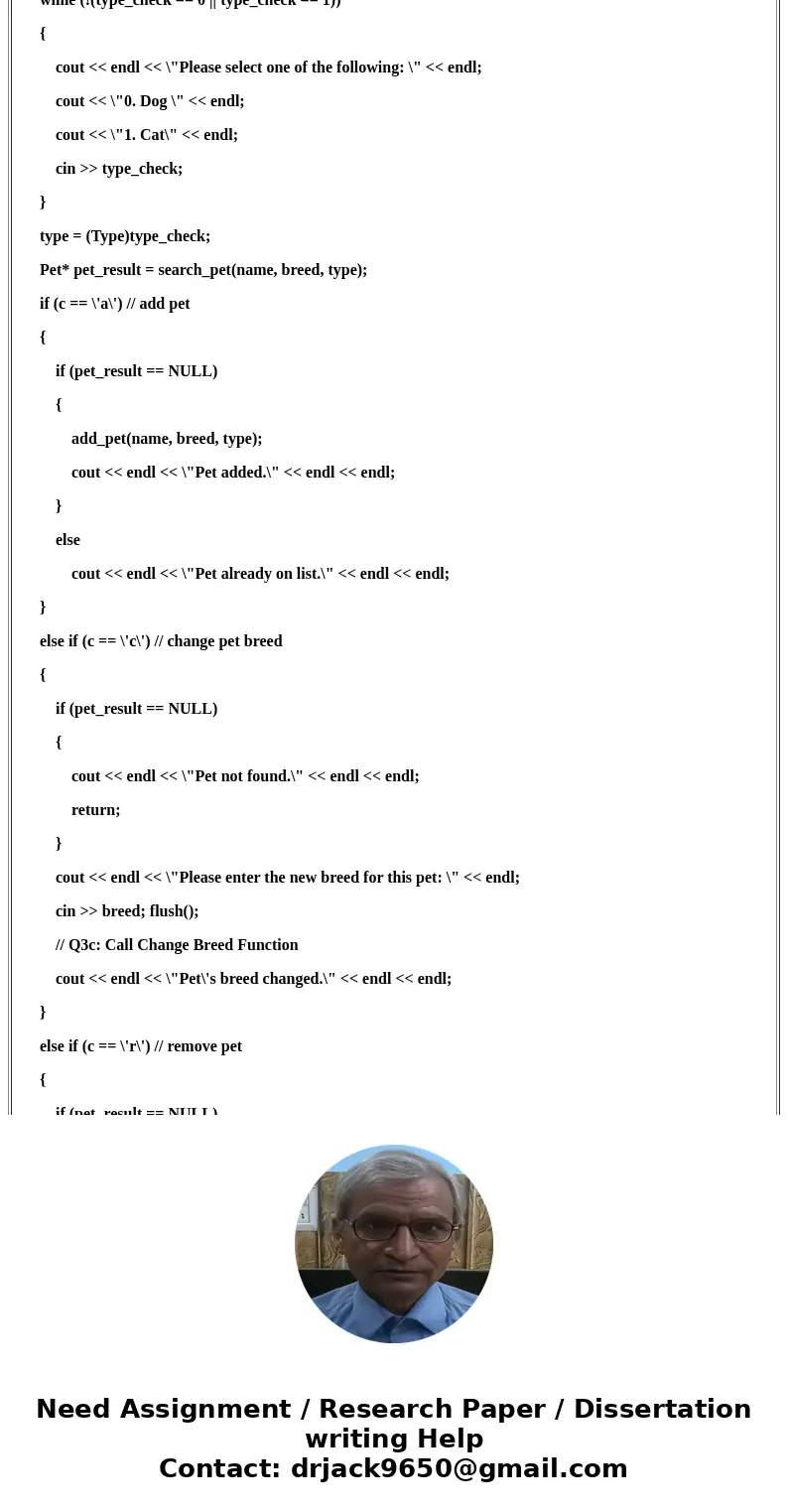
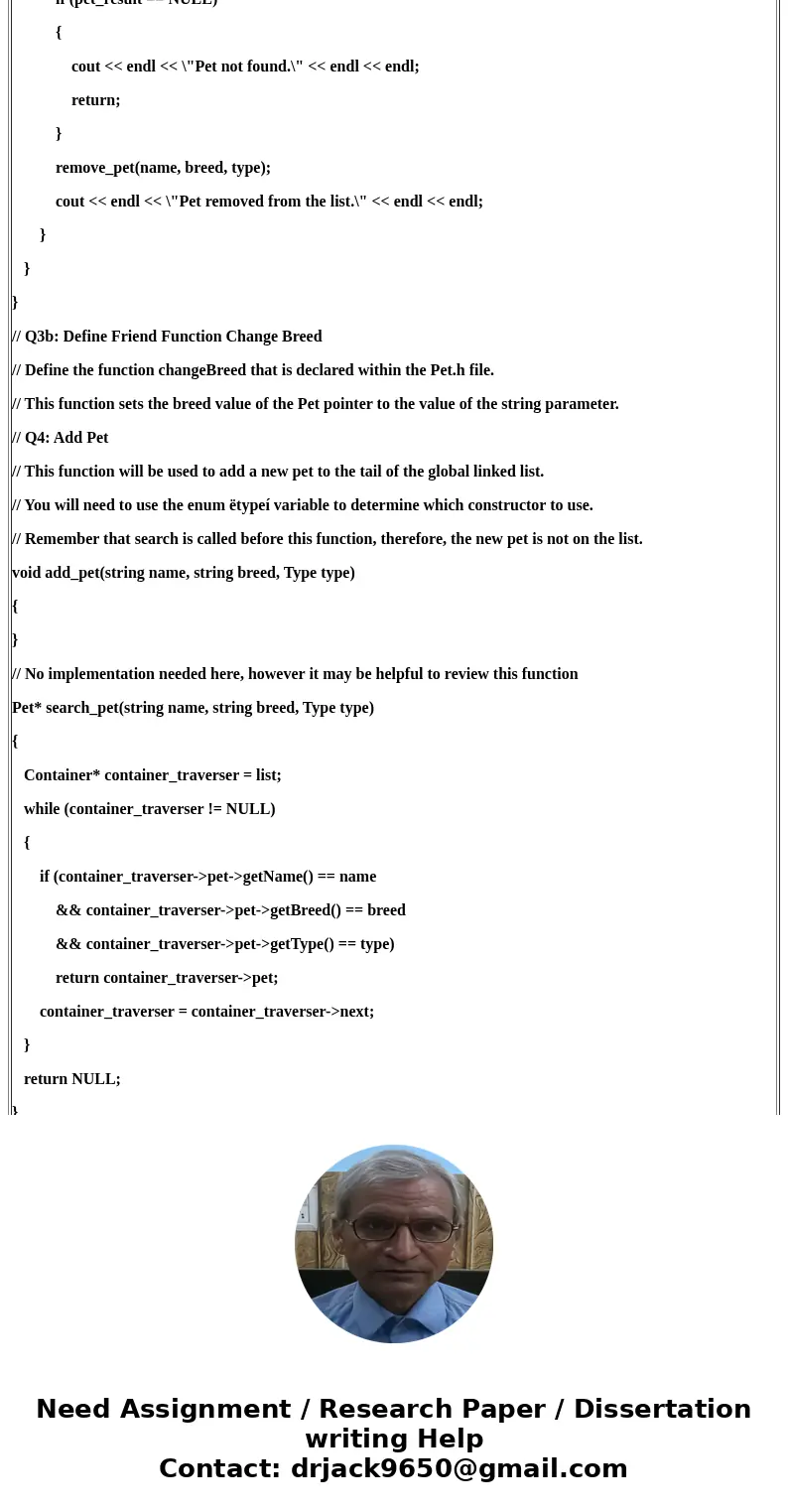
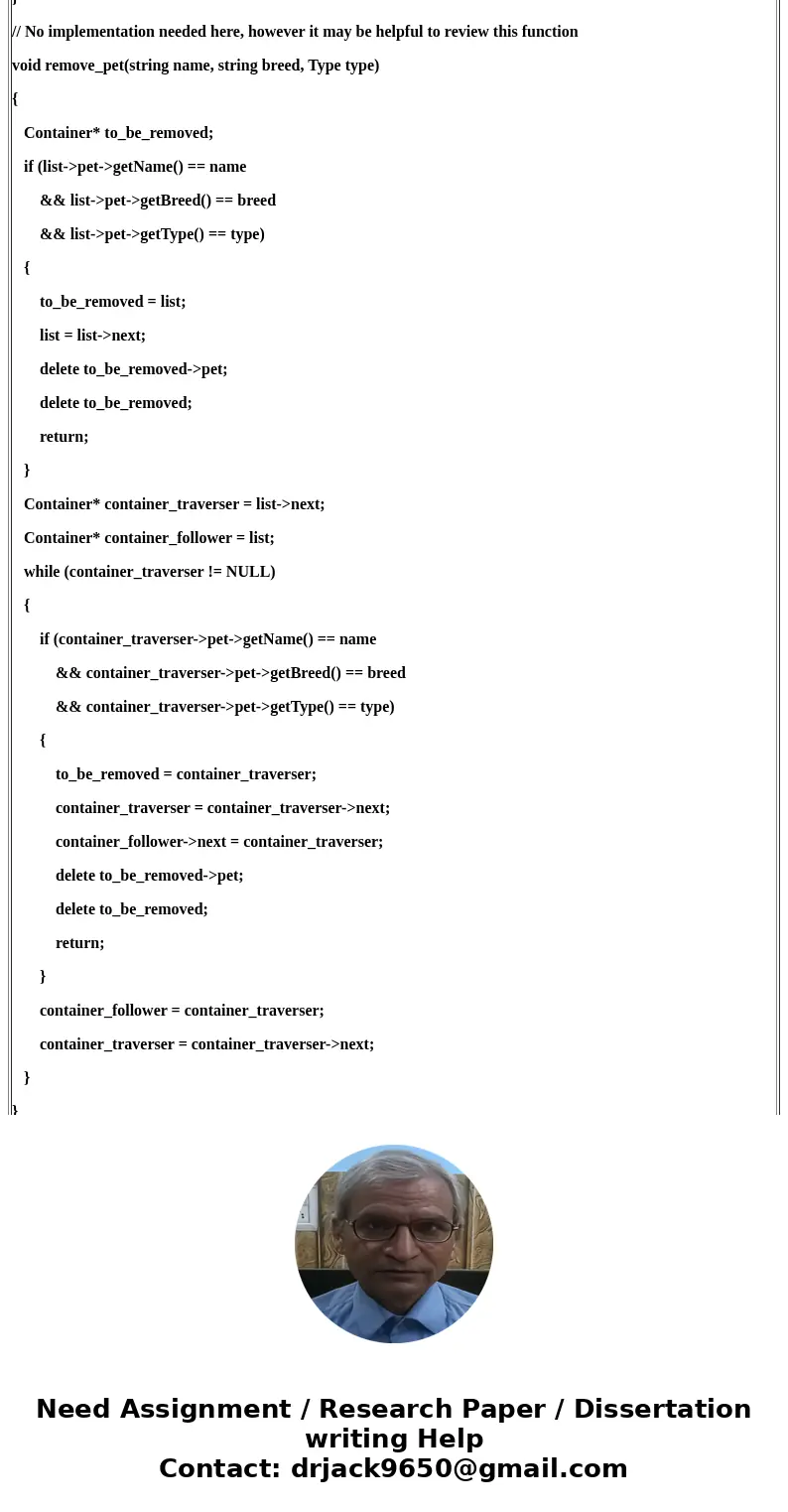
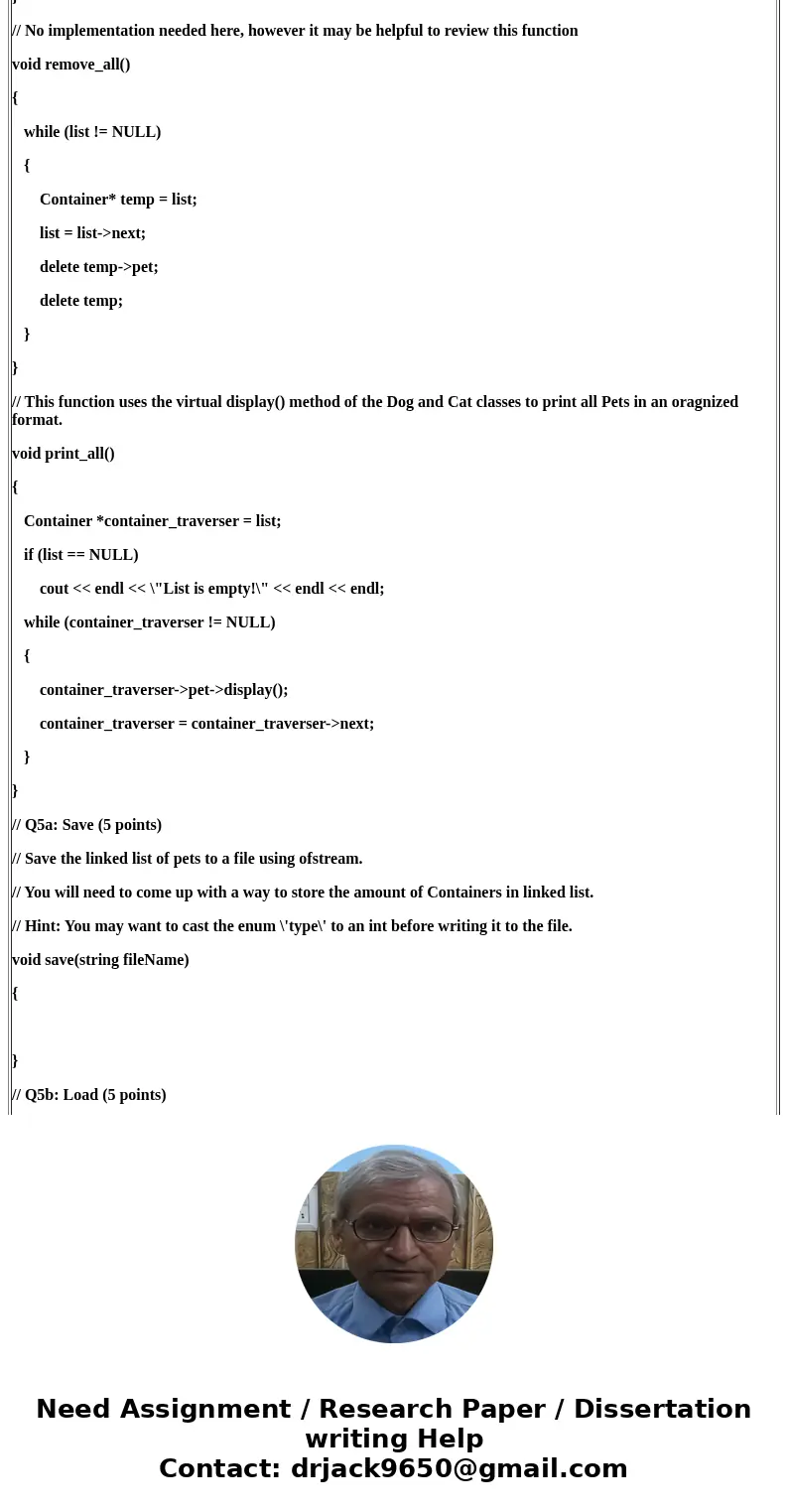
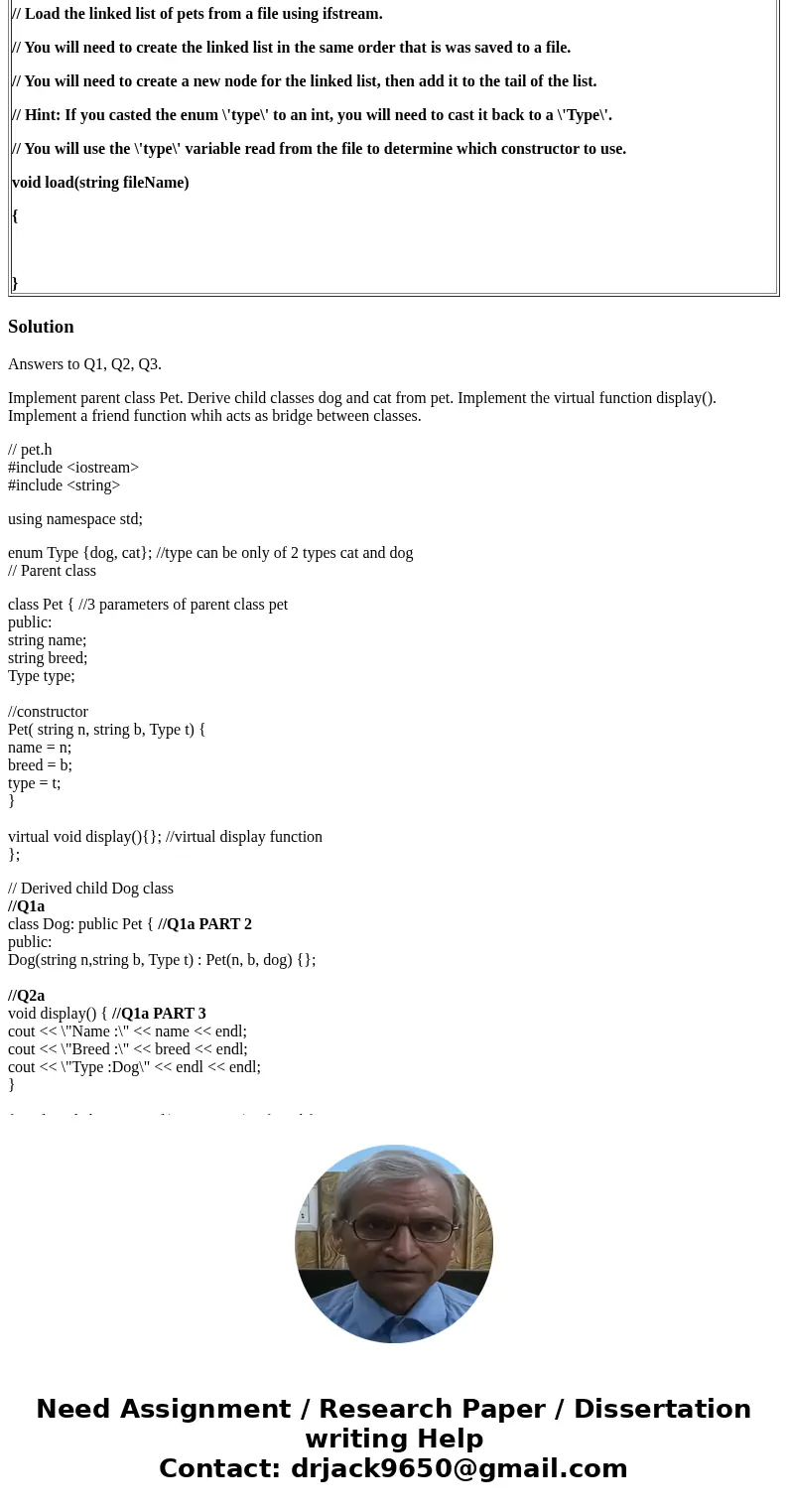
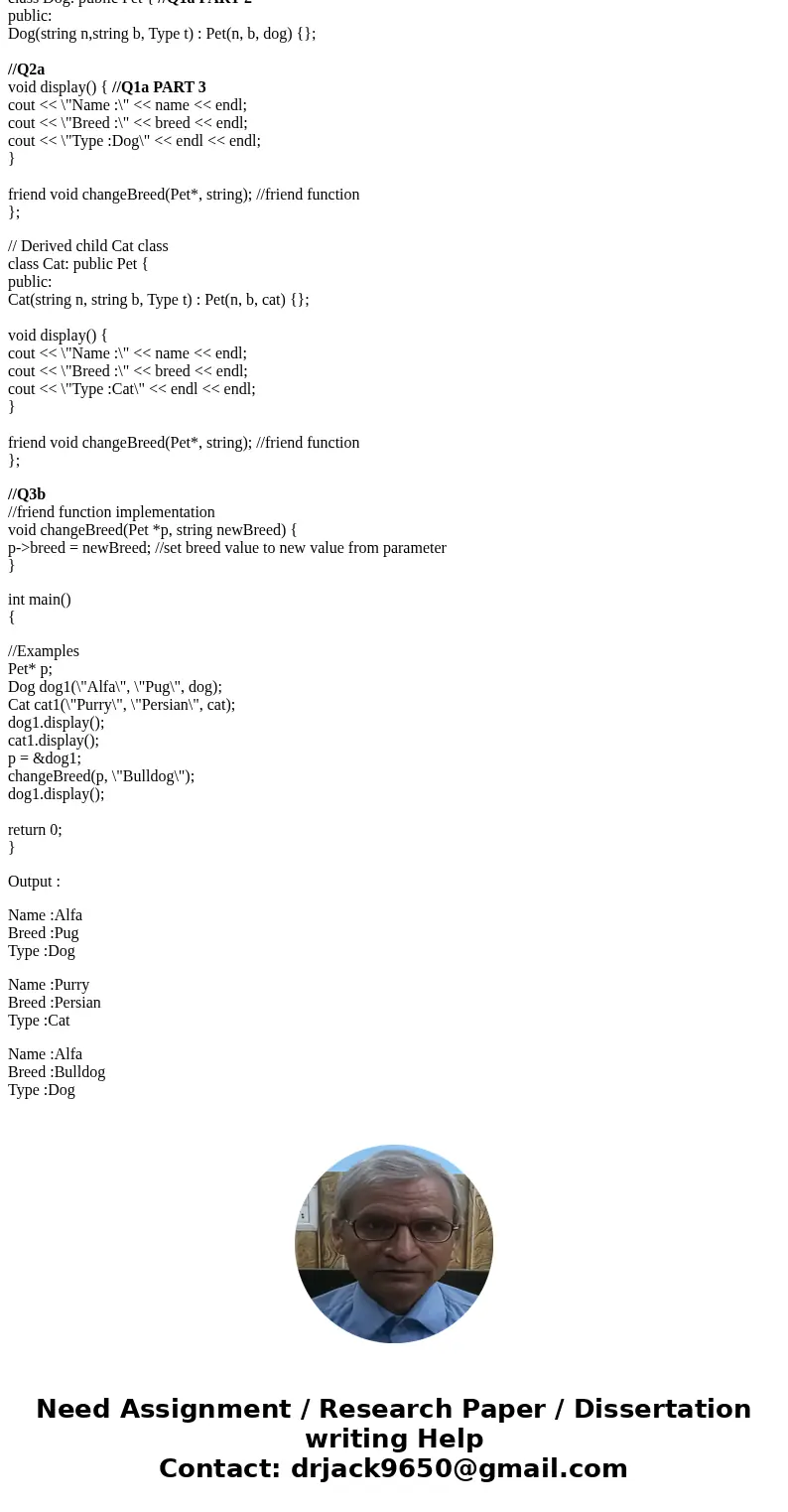
 Homework Sourse
Homework Sourse